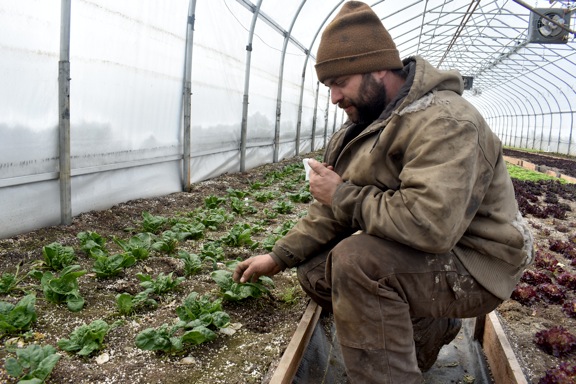SAVOR THE SEASON: Juniper Hill Farm grows food year-round

Adam Hainer of Juniper Hill Farm in Wadhams picks at lettuce on Thursday, March 14. (News photo — Griffin Kelly)
WADHAMS – Six days before the Vernal Equinox, lettuce plants in the Juniper Hill Farm greenhouse were already several inches tall.
On Thursday, March 14, the day the Lake Placid News visited the farm off Route 10, temperatures peaked in the 50s and thaw gave way to deep mud puddles. Owner Adam Hainer wore a tattered Carhartt jacket, thick work pants and boots caked in earth sludge. He had been fixing equipment in a greenhouse all morning, so his hands showed plenty of character – wide fingers with tough calluses and short nails covered in a layer of dry dirt. He was picking at the lettuce.
“I was a plant biology major in college, but I was not fit for the lab,” Hainer said. “I always had a large garden since elementary school, and I always produced my own food in high school and college. I just figured I might as well make a go of it and see if we can make a living out of it.”
Oftentimes, Hainer will grab his lunch directly from the ground and chew on some lettuce or a carrot. His motto is, “Why pay for something when I can grow it myself?”
Juniper Hill rests on a wide-open piece of land on the dead-end Loukes Road. Crops are produced year-round, and the 100-acre farm is home to pretty much every food that comes from the dirt.
“Asparagus, celery roots, tomatoes, sweet corn, pumpkins, winter squash – just about anything you can put on your plate,” Hainer said. “Carrots, sweet potatoes, potatoes, beets, cabbage.”
The USDA-certified organic goods can be found in stores and farmers markets throughout the region, such as the Green Goddess Natural Market in Lake Placid, Nori’s in Saranac Lake, the Saranac Lake Winter Market, the Snowy Grocery at the Sugar House Creamery in Upper Jay and the spring and summer markets in Saranac Lake, Lake Placid and Elizabethtown.
“Every time a consumer chooses to buy from a local farm, it helps us to keep our money local and reinvest it right back in this area, whether it be through employment or material purchasing,” Hainer said.
Hainer grew up on a property only a few hundred feet away. When he was a kid, his grandfather owned the farm, grew cattle feed and shipped it all around the country. The farm’s ownership left his family for a few years, but Hainer later bought it in 2007 to create a produce farm.
“Those early years were tough from time to time,” he said. “The local food scene had just started coming about, so sales were a little tough. Restaurants and chefs had just started thinking about using local products. Truthfully, we didn’t have production perfect, so it was challenging to get them the quality product they required.”
The farm also used to raise hogs and sell meat, but Hainer said it just got too complicated to manage both produce and livestock. They still have a few pigs, but those are mainly just for the employees.
Hainer called Tropical Storm Irene in 2011 a “big reality check.
“We had about 10 acres in a floodplain, and we lost just about everything,” he said.
Since then, Juniper Hill started farming on higher ground, added acreage and purchased new harvesting equipment.
One new-age technology Juniper Hill takes advantage of is oil recycling for keeping plants warm in the cold months. The farm uses old cooking oil to pump water through geothermal tunnels.
“We filter that and use it somewhat like bio-diesel,” Hainer said. “We burn straight veggie oil for a good percentage of the heat in the ground of these crops. So that’s a good way we’re recycling from the restaurants that also buy from us and other restaurants that don’t buy from us but have an excessive amount of fryer oil.”
Like many North Country businesses, Hainer said Juniper Hill sometimes finds difficulties in hiring. The farm has five full-time employees and hires 15 to 20 part-time employees during the growing season.
“Labor becomes your limiting factor,” Hainer said. “It’s very hard to find good people that want to show up every day in and out whether it’s muddy, wet, snowy. I’m thankful we’ve found quite a few people that are interested in farming.”
Juniper Hill often likes to use the tagline “Don’t let California feed New York” when it visits farmers markets. Hainer said the slogan is just another way to get people thinking about buying locally. If people buy locally, he said, the Adirondack region will be prepared if California ever loses its viability as a source for crops.
“(California) has been substantially affected by drought, so where does that leave us in 10 or 15 years? Will we have the infrastructure to grow the food for the park and all other the other people in the upstate region?”
In the meantime, Hainer and the Juniper Hill team of farming staff will continue to help the agriculture industry grow in Essex County.
“We feed a lot of people in the North Country, and we hope to continue doing so.”






